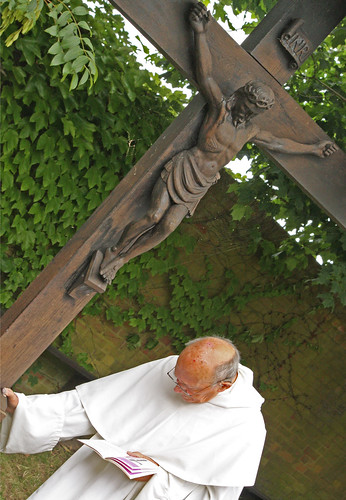St Paul, however, who was by all accounts a successful missionary and preacher, knew that he was a weak and sinful human being. He uses the word astheneia, which is translated as 'weakness', extensively in his major writings. In the first place all human beings are weak and utterly dependent on God's grace. Consequently, whatever we achieve is a result of God's activity in our lives. As Paul said, "But we have this treasure [of the Gospel] in earthen vessels, to show that the transcendent power belongs to God and not to us" (2 Cor. 4:7).
The marvel of God's love is that he cherishes us and uses us despite our failings. So we need not hide our weakness before God; he does not check our CV before using us. God uses us as we are, and indeed it is because we are weak and in need of God that God's power is displayed. So, for Paul, human weakness provides the best channel for divine power. As he says in 2 Corinthians 12:9, "[The Lord] said to me 'My grace is sufficient for you, for my power is made perfect in weakness.' I will all the more gladly boast of my weaknesses, that the power of Christ may rest upon me."
This work of grace which transforms us and shapes us according to the pattern of Christ is the work of the Holy Spirit. Thus St Paul says that "the Spirit helps us in our weakness" (Rom 8:26), and the goal of this transformation is that, having died with Christ, we might also rise with him.

The marvel of God's love is that he cherishes us and uses us despite our failings. So we need not hide our weakness before God; he does not check our CV before using us. God uses us as we are, and indeed it is because we are weak and in need of God that God's power is displayed. So, for Paul, human weakness provides the best channel for divine power. As he says in 2 Corinthians 12:9, "[The Lord] said to me 'My grace is sufficient for you, for my power is made perfect in weakness.' I will all the more gladly boast of my weaknesses, that the power of Christ may rest upon me."
The ultimate sign of God working in what the world might consider weakness is Christ crucified. For it is through the weakness of the Cross that God's power of love, the power of Christ's resurrection, is displayed for all to see and transforms the world. And so, we are called to imitate the Cross of Christ in our lives, so that empowered by God, our human weakness (with all its trials and suffering) may be borne courageously and gradually transformed by grace.
This work of grace which transforms us and shapes us according to the pattern of Christ is the work of the Holy Spirit. Thus St Paul says that "the Spirit helps us in our weakness" (Rom 8:26), and the goal of this transformation is that, having died with Christ, we might also rise with him.
Therefore, Paul's concept of weakness emphasises the power of God's grace and his transforming love. This ought to encourage us, for when we recognise our complete need of God and realise that we cannot strive for happiness apart from God, then we can serenely allow God to work in our lives, to be like clay in the hands of the divine Potter and allow God to use us "in order to make known the riches of his glory" (Rom 9:23).
No comments:
Post a Comment